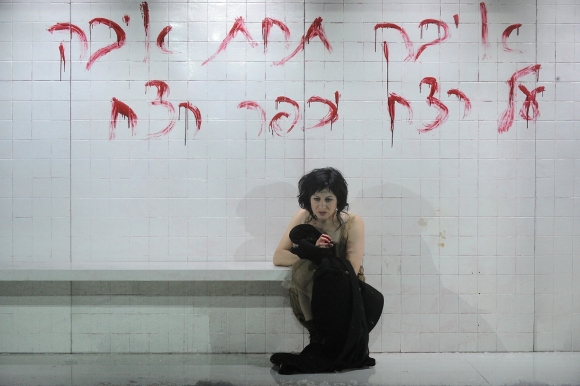
The tragic figure of Electra is given contemporary resonance and painful relevance in the Cameri Theatre production directed by Kfir Azoulay. For those who might regard Greek tragedy as remote and arcane, the emotional impact of this production, powered by the intense performances of Ola Shur-Selektar and Helena Yaralova, soon dispels any sense of distance. In the intimacy of Cameri III, the play becomes a chamber piece with the actors literally close enough to touch, and one might emerge from this experience with the feeling of having been implicated in the events themselves, no longer merely a viewer, a member of the audience, but a witness.
Ola Shur-Selektar portrays an Electra stuck in time, mourning the past with no hope for the future, an adult living the life of an adolescent, dependent on the mother whom she cannot forgive. Stunningly understated, yet seething with emotions, her body language is nuanced and precise, her gaze at once sword and wound. She cannot take action, she cannot move forward, condemned to relive daily the horror of the past: her father’s murder.
The story is well known from Greek history and mythology, and has received different treatments, from Aeschylus’ Oresteia, to Sophocles’ and Euripedes’ Electra, the latter two considered to have been written in about the same period. Sophocles’ Electra is presented here in the translation by Aharon Shabtai, one that is written in a high register, without current Hebrew colloquialisms, giving it a transparency that lets the story and emotions flow freely, unencumbered, timeless. There is quite a back-story to this play, but no need to do any studying, it all becomes apparent quite effortlessly in the first few minutes of the play.
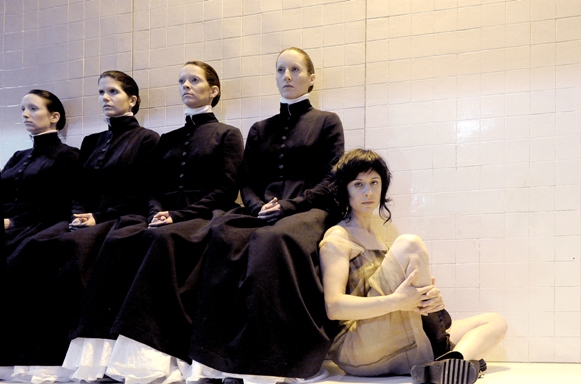
In brief: Electra is a daughter of the House of Atreus. Her father, Agamemnon, sacrificed her sister Iphigenia to appease the gods and set out to battle against the Trojans to avenge the kidnapping of Helen, wife of Agamemnon’s brother Menelaus. Returning victorious from the war, Agamemnon was killed by his wife Clytemnestra, and succeeded on the throne by her lover Aegisthus. Electra, fearing for the life of her young brother (and legitimate heir to Agamemnon’s throne) Orestes, arranges to have the boy protected in exile. The essence of this family tragedy is conveyed in an edgy, wordless video by Yoav Cohen, the sets a mood and tone while delivering all the necessary information.
Electra mourns her father and refuses to accept the sovereignty of Clytemnestra and Aegisthus. She appeals to the “Spirits of Justice” who “seek justice for those wrongfully murdered.” Yet she pays a price for her moral stance: she is an outcast in her own home, consigned to a servile position, denigrated and ignored. The set design by Polina Adamov, simple yet eloquent, depicts a palace gray and impenetrable as a prison, and such it is for Electra. She is an adult without a home of her own, she is not married, she has no children. Without status, without strength other than the strength of her own resolve and passive resistance to the rule of Aegisthus, she clings to one remaining hope: the return of her younger brother Orestes to avenge the death of their father. Electra seeks justice, and she calls for revenge; but would revenge be justice?
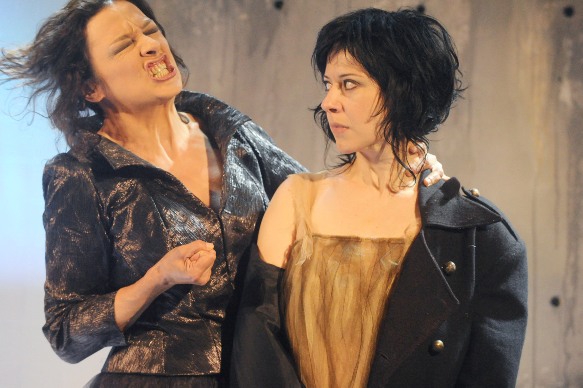
The confrontation between Electra and Clytemnestra (Helena Yaralova) is a psychological and ethical thriller. Decked out in bad-girl rockstar gear – a glittering black jacket and gray tulle skirt, Clytemnestra is the definitive nightmare mom, a drop dead diva who will stop at nothing to get her way. Electra gives off an emo vibe in a long black coat several sizes too big and boots with the laces undone, nothing fits, figuratively and literally. The two actors find a perfect balance between the mother-daughter arguments that sound so familiar – “you never listen” – and the dark accusations of murder. Where is justice to be found? Clytemnestra argues her point, the unjust sacrifice of Iphigenia, as the reason for killing Agamemnon. Yet if revenge is the just response to wrongful killing, the cycle of killing will be endless. Is that justice?
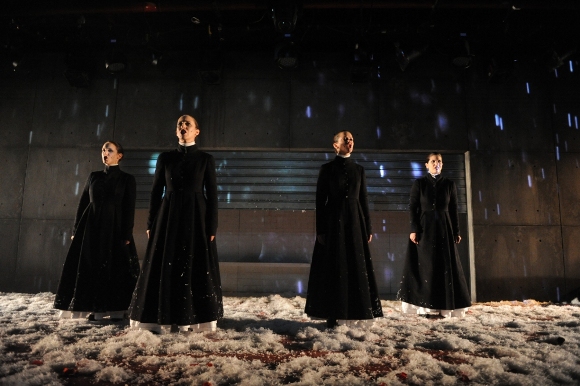
It’s a compelling tale, and director Azoulay has created a chilling interpretation, set in a wintry scene. The gray palace/fortress opens onto a snowy landscape, and the chorus are all clad in severe garb, long black coats over white gowns, somewhere between nuns and prison guards. These four women support and gently guide Electra in word and song. The music is yet another bridge between past and present, reflecting the function of the chorus in ancient Greece. Original music by Eldad Lidor, under the direction and with arrangements by Eldad Adar, embracing lyric melodies and a present day sensibility. In one sequence the song is transformed by a rap beat, then returns to a melodic song, only to take on an incantatory power as they chant: “vengeance will come.”
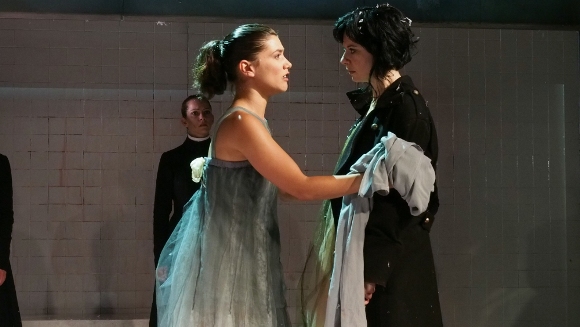
Chrysothemis (Gloria Bass) establishes the perfect foil for Electra – the gentler younger sister who has chosen to compromise, and therefore leads a more comfortable existence. Their relationship is reminiscent of another pair of sisters, the fiercely moral Antigone, and the placating Ismene. Yet, unlike Sophocles’ Antigone, Electra’s fate is more ambiguous and complex. Although in one sense, the narrative arrives at its resolution, the future of the protagonist remains unsettled, and unsettling. Antigone pays with her life for her beliefs, while King Creon realizes that he too is guilty, and takes responsibility for the death of his son and Antigone. Electra lives, yet under Azoulay’s direction, Electra leaves us with more questions than answers.
Vengeance has come, yet this play ends not with words, but with silence, as Electra remains alone, outside, contemplating the horror. Having wreaked her vengeance on Clytemnestra and Aegisthus, Electra remains as deeply implicated in the cycle of violence as she ever was, stuck in time, unable to move forward. Electra’s tale is replete with violence and vengeance, but there is no sense of justice, just an ever-flowing tide of blood.
Moving, harrowing and insightful, Electra is all too relevant to our place and time. Let us not confuse vengeance with justice, let us seek instead to find compassion.
Electra by Sophocles
Translated by Aharon Shabtai; Directed by Kfir Azoulai; Set and costumes: Polina Adamov; Original music: Eldad Lidor; Music direction and arrangements: Eldad Adar; Lighting: Keren Granek; Video art: Yoav Cohen; Assistant director and research: Ido Setter; Cast: Ola Shur-Selektar (Electra), Udi Rothschild (Orestes), Helena Yaralova (Clytemnestra), Yossi Kantz (Pedagogue), Gloria Bass (Chrysothemis), Yigael Zachs (Aegisthus); Chorus: Hagar Danon, Mona Mor-Markovitch, Liat Stern, Dana Vishinsky.





